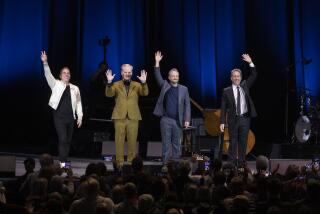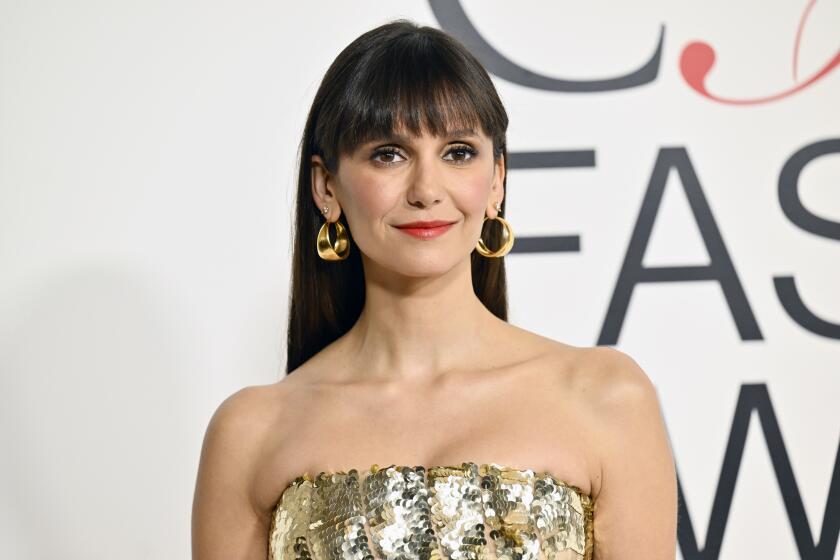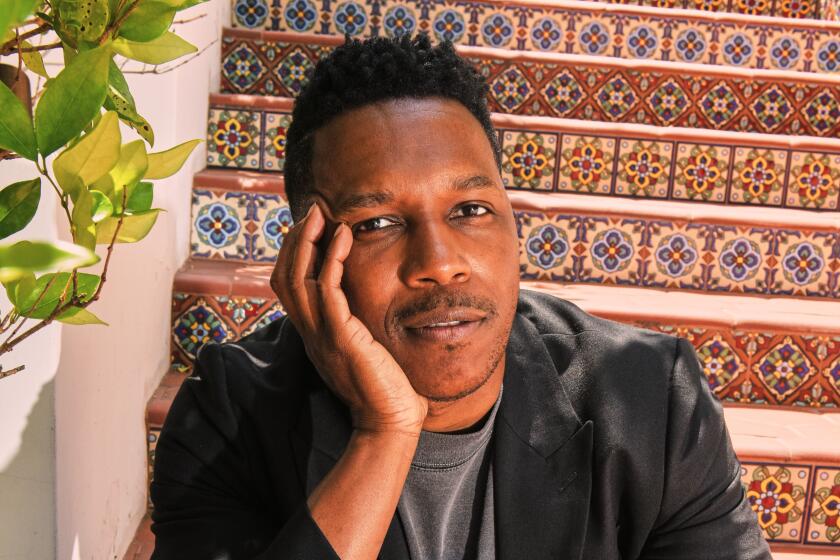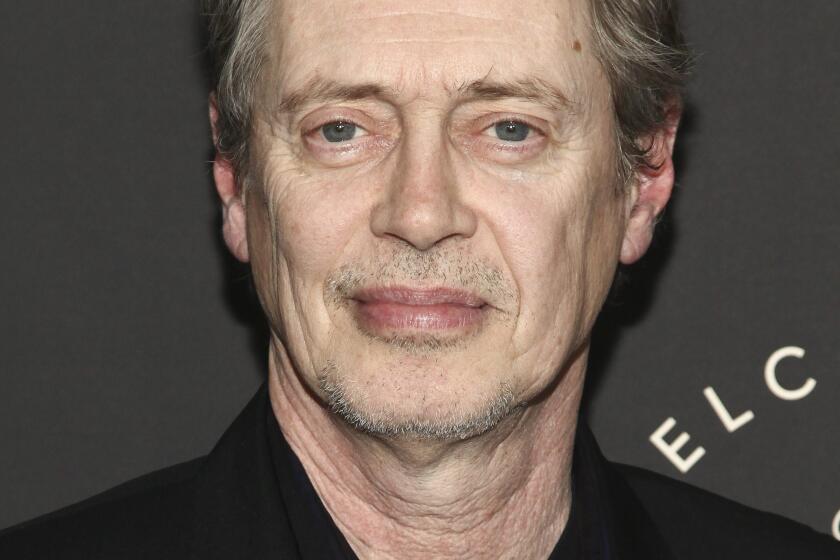‘Wet Hot American Summer’ cast and crew reflect on path from oddball comedy indie to cult classic
When “Wet Hot American Summer” was released in theaters in July of 2001, the oddball comedy brought in just $295,000 at the box office — barely enough to buy a house in the suburbs, much less recoup its meager $1.8-million budget.
Not that anyone expected the oddball indie, set on a single day at a Jewish summer camp in 1981 and featuring a talking can of vegetables, to be a blockbuster. Written by David Wain and Michael Showalter, veterans of the NYU sketch-comedy troupe turned short-lived MTV show, “The State,” it was always going to have a niche appeal.
More surprising, though, was the scathing response from the critics, who were baffled by the movie’s intentional absurdity, willfully bad dialogue and skewed parody of raunchy ‘80s comedies like “Meatballs.” Roger Ebert hated it so much he wrote his review in the form of alternate lyrics to the novelty hit “Hello Muddah, Hello Faddah”: “Life’s too short for cinematic torture,” he declared.
Full coverage: Television Crtitics Association press tour 2015
But propelled by the ardor of comedy nerds, the movie found a second life on DVD. Fourteen years after it flamed out in theaters, “Wet Hot American Summer” is a widely quoted cult favorite whose off-kilter sensibility, once so perplexing, is now the comedy norm. Meanwhile, cast members including Amy Poehler, Paul Rudd, Elizabeth Banks and Bradley Cooper have become major stars.
It’s little wonder that Netflix, the online network that resurrected the similarly beloved “Arrested Development” in 2013, decided to make an eight-episode prequel series, “Wet Hot American Summer: First Day of Camp,” which debuts Friday.
In a sign of “Wet Hot American Summer’s” enduring popularity, Wain and Showalter were not only able to get the original cast — three-time Oscar nominees included — to return, but they also attracted a whole new batch of marquee names, including Kristen Wiig, Josh Charles and seemingly the entire ensemble of “Mad Men.”
Here, the cast and creators of “Wet Hot American Summer” chart its unlikely journey from box-office failure to small-screen revival.
Origins
David Wain, director and co-writer: It was really sourced in the experiences that Michael and I had at our respective summer camps, and not so much camp movies. When people refer to “Wet Hot” as a spoof of ‘80s summer camp movies, that wasn’t at all how we thought of it. It’s certainly not to me the kind of movie where it’s like, “here’s this reference to this movie.”
Paul Rudd, “Andy”: I read the script, and I thought it was so funny that I would take it out and reread it before it was ever getting set up or made into a movie. I just thought reading it was so fun.
Wain: It was a time in New York City when there was a booming indie film movement. There were a lot of characters that were wanting to get into the business and pretending to have access to money but ... it wasn’t a simple genre template that people could understand enough to be like, yes, let’s finance it. Mainly we were trying to capitalize that we had Janeane Garofalo attached. That was our main draw.
Janeane Garofalo, “Beth”: The last episode of “The Jon Stewart Show,” “The State” and myself were guests, that’s when I first met them. … It was a project that Michael and David were very passionate about, and they’d asked me to participate in some read-throughs and would I participate if it ever saw the light of day. I immediately said yes. It was one of those things where you have no idea if it’s going to get made but you believe in those people.
Making the movie
Wain: We were all living in the camp bunks, and the line between being at camp and making a movie about camp was very gray. ... We had the classic issues that any low-budget independent film has in terms of trying to cut corners. Then we had the extra surprise element that shooting that spring in Pennsylvania was unexpectedly extremely cold and pouring rain nearly every day, and this is all supposed to take place on sunny single day in August.
Garofalo: Everybody involved in it was doing it because they wanted to be there. There was certainly not a lot of financial gain, and it was a difficult thing to get done. ... There was a lot of alcohol, Jack Daniels everywhere and a location where you just had to be up the next day and literally 15 feet away to shoot.
Ken Marino, “Victor”: I was one of the first people who got there. It was me, A.D. Miles and Amy Poehler. We were throwing balled-up socks through the hallways and entertaining ourselves. It was a magical, special lightning-in-a-bottle experience. I remember [cast member] Zak Orth was laughing about how stupid the movie was and saying nobody cares if the movie even came out — we were just having so much fun.
The reaction
Michael Showalter, co-writer, “Coop”: The way that the movie was presented, I think people were expecting “Meatballs.” They weren’t expecting something as meta as “Wet Hot.” If you look at the poster for it, it looks like a big fun straightforward ensemble comedy. The movie is so heavy in the deconstruction of those kinds of movies that I think there was a collective “What is this?” There was a total disconnect between the kind of movie we thought we’d made and the way that it was being received.
Wain: Every filmmaker always says the distributor screwed it up. I can’t lie, I felt that was certainly part of it. We were with this company that soon went out of business afterward, USA Films, and they certainly didn’t believe in it enough to do much with it and that became something self-fulfilling.
Rudd: The people that were the heads of [USA Films], they didn’t get this movie at all. They didn’t know what to do with it, but every one of the assistants, the interns, the people answering the phones were obsessed with it. And it’s like, yeah, that makes sense. Critics I really admire, like Roger Ebert, completely slammed the movie. It didn’t surprise me.
Showalter: For me, I didn’t understand the animosity. That’s where the hurt is for me. I still feel bitter about it. ... It was devastating.
Wain: Some of those early reviews were so, so hostile. They would say things like, “I would rather shove spikes into my head than ever watch this movie again.” I had to laugh. I saw it as something of a badge of honor. … The movie was just not falling into categories that some people understand. It never got that mainstream box office, but it seems to have stood the test of time.
The redemption
Wain: In 2003, they started to do midnight screenings in New York, and little by little by little, you started hearing more about it. ... It was really helped by the fact that it was never a mainstream success, so people have a certain sense of ownership when they do find it.
Marino: One of the reasons it took a while for the original to catch on, it was a specific type of comedy that I think was fresh and new, and it took a little time for people to get it and enjoy it.
Rudd: It was a little ahead of its time. ... When I would meet comedy writers, anybody that was way into comedy, that’s the movie that people would talk about. When I met [director] Adam McKay the first time, years before he made “Anchorman,” he’d say, “Oh, ‘Wet Hot American Summer.’” … I could always tell, this person is a “Wet Hot” fan. They were always the most interesting or coolest or most hip.
The revival
Showalter: We had a 10-year reunion around five years ago, and that kind of got everybody percolating. Around that time we started to have serious conversations around another project. David suggested [Netflix] to me. It felt like this could be a really cool way to do a next project as a multi-part thing rather than just a one-off feature.
Cindy Holland, vice president of original content at Netflix: David Wain and Michael Showalter came to us with the notion of creating a prequel series to the cult classic, and we were really excited. … We had had “Wet Hot American Summer” on the service both on DVD and for streaming for a period of time. We size up the potential audience for a given project, and we’re always happy when we can find something that has a really core fan base that endures over time.
Wain: It’s the same world and the same sense of humor and the same people in front of the camera. The experience was refreshingly, and wonderfully, the same.
MORE ON NETFLIX:
Netflix’s ‘Beasts of No Nation’ hints at hazy hybrid future
Chelsea Handler on her new Netflix life: ‘I’m very happy where I am now’
Here’s everything the TCA’s revealed about Marvel’s ‘Jessica Jones’ Netflix series
More to Read
The complete guide to home viewing
Get Screen Gab for everything about the TV shows and streaming movies everyone’s talking about.
You may occasionally receive promotional content from the Los Angeles Times.






